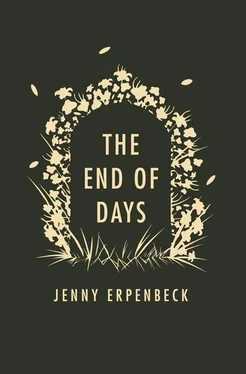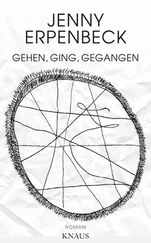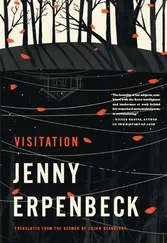Jenny Erpenbeck - The End of Days
Здесь есть возможность читать онлайн «Jenny Erpenbeck - The End of Days» весь текст электронной книги совершенно бесплатно (целиком полную версию без сокращений). В некоторых случаях можно слушать аудио, скачать через торрент в формате fb2 и присутствует краткое содержание. Год выпуска: 2014, Издательство: New Directions Publishing, Жанр: Современная проза, на английском языке. Описание произведения, (предисловие) а так же отзывы посетителей доступны на портале библиотеки ЛибКат.
- Название:The End of Days
- Автор:
- Издательство:New Directions Publishing
- Жанр:
- Год:2014
- ISBN:нет данных
- Рейтинг книги:4 / 5. Голосов: 1
-
Избранное:Добавить в избранное
- Отзывы:
-
Ваша оценка:
- 80
- 1
- 2
- 3
- 4
- 5
The End of Days: краткое содержание, описание и аннотация
Предлагаем к чтению аннотацию, описание, краткое содержание или предисловие (зависит от того, что написал сам автор книги «The End of Days»). Если вы не нашли необходимую информацию о книге — напишите в комментариях, мы постараемся отыскать её.
The End of Days — читать онлайн бесплатно полную книгу (весь текст) целиком
Ниже представлен текст книги, разбитый по страницам. Система сохранения места последней прочитанной страницы, позволяет с удобством читать онлайн бесплатно книгу «The End of Days», без необходимости каждый раз заново искать на чём Вы остановились. Поставьте закладку, и сможете в любой момент перейти на страницу, на которой закончили чтение.
Интервал:
Закладка:
5
It’s true, she is awake, and now there is this next day, and this day, too, she will spend sitting on the footstool. During the night or early that morning, her mother apparently cleared away the bowls of food, untouched by the mourner. She hears someone clattering around in the kitchen, water splashing, something being pushed aside on the table, footsteps crossing the floor, the clink of porcelain. In the baby’s room, in any case, there is nothing left to do. It wasn’t as she had feared yesterday: that while she was sleeping she would forget what had happened and the memory would come crashing down on her with all its weight when she woke up. No, all through her sleep she had known that her child was no longer alive, and when she woke up, she knew it still, sleep had been no more and no less leaden than wakefulness, so she had been spared seeing her worn-out workaday reality collapse once more. When she rises to sit again upon the footstool, everything goes quiet in the kitchen, as if her mother is listening to see what she is up to now that she’s stirring again. Why has life at home become so much like hunting? In the parlor, the miniature grandfather clock strikes six with bright, tinny strokes, then all is perfectly quiet once more. Her husband, it would appear, is still out. Yesterday, when they returned to the house after the funeral and she sat down on the stool, he had tried to lift her up, and when he didn’t succeed, he ran out of the house. She hasn’t seen him since. Will the same thing now happen to her as happened to her mother? When, as a little girl, she tried to imagine where her father might be instead of with his family, she always envisioned someone who had hanged himself. Father might be in America, her mother had said. Or in France. But she didn’t believe it. Her mother always spoke of her father’s absence as something definitive, irreversible, never allowing her daughter the faintest hope that he might return home, or even prove to be nearby — in the district capital, for instance, with another wife and new children. Sometimes, introducing herself, she had the impression people were caught off guard when she said her name. In America, her mother said, or in France. But she herself never imagined her father as a living man, neither in America nor France, nor saw him living nearby; she only ever envisioned him as someone who had, for instance, hanged himself; and if anything was nearby, it was the forest where his body had swung, maybe she’d already walked right past the tree he’d tied his noose to.
Do you need anything, her mother asks. Behind her, the sun is shining into the kitchen, which is why her mother looks like a silhouette. The daughter shakes her head. On this second day of sitting, she and her mother don’t say much. No one knows her mother better than she does, and no one knows her better than her mother, so there’s not much to say. She sits there, thinking about the fact that a part of her is now lying in the ground and beginning to rot, then she looks at her skin, which is still surrounded by air, alive. A friend comes to visit, she has more bowls with her, and says: You’ll have a second child, and a third and a fourth. She says: We’ll see. One of the bowls her friend has brought has eggs in it, she knows this is customary, but doesn’t want to eat them. One neighbor doesn’t even knock, she just bursts in, violently weeping, and doesn’t even scrape the snow from her shoes before falling along with her tears at the mourner’s feet, Praised be our sole Judge, she cries, and then gets up again to fling her arms around the neck of the mourner’s mother, sobbing, why oh why, shaking her head, and then she stops saying anything at all because she is weeping so hard her voice is not available for use. Simon, the coachman, comes, he stops just inside the hallway door and says he’s sorry and that he’s brought a bit of soup and that his wife sends her condolences, unfortunately she can’t come herself because she’s so sick. Another of her friends comes and says: Right from the beginning I thought it was pale. Then another: Why didn’t you send for the doctor? Did it really happen that fast? A third: When they’re so young, the slightest little thing is enough to do them in, who knows what the Lord in His infinite greatness was thinking! A fourth: Where in the world is your husband?
In the evening her grandmother arrives, sits down on the floor beside her, takes her stocking feet in her lap and warms them with her hands, only then is the granddaughter able to cry for the first time since the death of her child. On the third day this, that, and the other visitor comes. As if approaching an altar, friends and former neighbors from the ghetto come to stand before the footstool with its mourner, bringing her food and words of comfort, they themselves know what it means to lose a child, or else they don’t know, and no doubt quite a few of them are pleased that it happened to be the one who married the goy, etc., but that’s not what they say, instead they say, for example: But of course the main thing is that you yourself are still alive. As for her, she is incapable of crying when visitors are there, and by the third day she is very weary of being the recipient of all the comfort and support it is the sacred duty of these visitors to bestow on her, she doesn’t know how she can bear it that her child’s death still persists, that from now on it will persist for all eternity and never diminish, but she doesn’t speak of this to anyone. On the evening of the third day she knows that if her husband has not yet returned, he is not going to. She asks her mother what it is like to live without a husband. Her mother says: Hard. One of her friends says: You’ll see, tomorrow at the latest he’ll be back, he’s probably just drowning his sorrows. Her grandmother sits down beside her and sings her a lullaby. Has the time in which she was a grown woman now come to an end? If she has missed the road leading forward, will time simply reverse itself and go back again? On the fourth day, her own mourning seems alien to her and she thinks that perhaps it doesn’t really matter whether a being is on one side of the border or the other. On the fifth day, her mother says, we have to think about what comes next. On the sixth day, the clock strikes all the hours contained in a day, with its bright, tinny chime. Might it be time now to go looking for her father, if he happens not to have hanged himself? On the morning of the seventh day, her mother helps her to get up and leads her to the table in the kitchen. Only after the daughter has sat down does her mother say to her: We have to start economizing. On this seventh day the daughter realizes for the first time that she herself is also a daughter, one who has been alive all this time and whose life is only now, with a short delay of seventeen years, breaking down. No one can predict when it will be revealed that a wish is going to be left unfulfilled. Her mother sits down beside her, takes her hands, and says: Your father was beaten to death by the Poles.
6
Now he knows where to find the agency, the bald-headed man gave him the address. When he goes out onto the street, it suddenly occurs to him that the first child of one of his colleagues also died young. One day, shortly after the baby’s death, his colleague asked him if he wanted to see the grave. Yes, he said, although he didn’t really want to, and so the two of them walked across the cemetery during their lunch break. His colleague showed him the child’s name on an iron plaque on a wall to the left, the mound of earth in front of it, and the stone border with the little railing. Not even a year and a half later, this same colleague became a father again, and the newborn was given the name of the deceased child as its middle name when it was baptized. He goes into the bank to withdraw the sum his journey will cost. At the exchange office next door, he obtains the twenty dollars in American currency he’ll need to enter the country, as the bald-headed man instructed him. He remembers how his wife laughed when he would imitate for her what she looked like when she was sleeping. They laughed at the same jokes over and over, laughing again and again at next to nothing; when his mother-in-law was with them, she rarely understood what they were going on about and would just shrug. Soon his train will pass over the very rails he looked after until now, one hour and twenty minutes is what this leg of the journey will take, that’s all — the stretch of track for which he used to be responsible is tiny compared to the length of the entire journey he now intends to embark on. When he embraced his wife, her bosom fit perfectly below the curve of his ribs. Sometimes they would just stand there like that, happy; sometimes they would make faces together in the mirror; once he had stuck the tip of his mustache in her ear; another time, rubbed his nose against hers. The journey will take him by land to Bremen, and there, the bald-headed man explained to him, he will board a ship; the ship is called Speranza . Then they asked themselves whether other people also did things like that when they were alone.
Читать дальшеИнтервал:
Закладка:
Похожие книги на «The End of Days»
Представляем Вашему вниманию похожие книги на «The End of Days» списком для выбора. Мы отобрали схожую по названию и смыслу литературу в надежде предоставить читателям больше вариантов отыскать новые, интересные, ещё непрочитанные произведения.
Обсуждение, отзывы о книге «The End of Days» и просто собственные мнения читателей. Оставьте ваши комментарии, напишите, что Вы думаете о произведении, его смысле или главных героях. Укажите что конкретно понравилось, а что нет, и почему Вы так считаете.












